

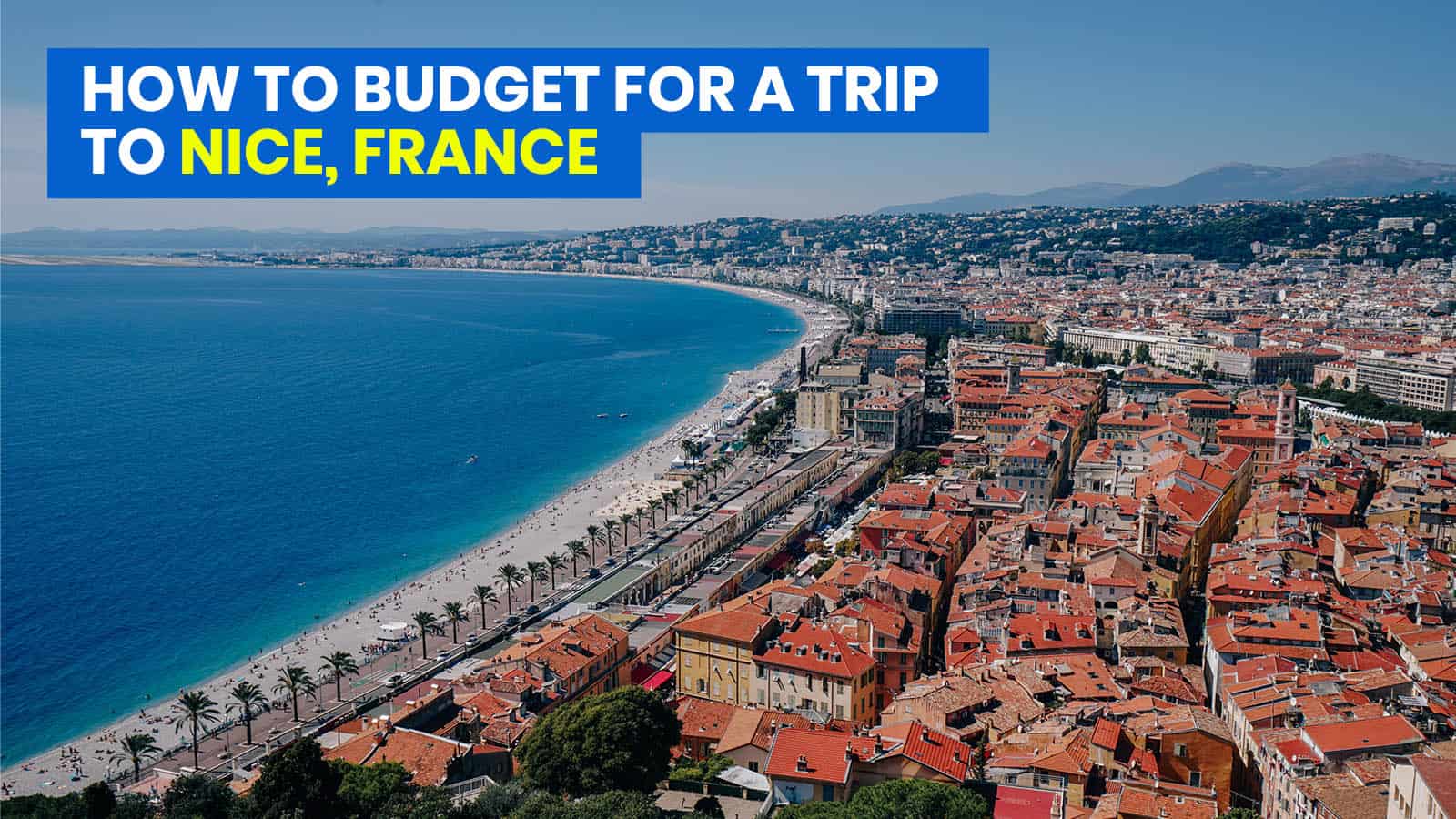
The French Riviera, in general, has made a reputation for being the favorite playground for the rich and famous. For over a century, it was the go-to destination for Russian and British aristocrats including Queen Victoria. It has also inspired artists like Pablo Picasso and Henri Matisse. Today, it remains highly associated with celebrities and wealthy personalities. From the prestigious film festival in Cannes to the yacht vacations in Saint-Tropez (hello, Leo!), the French Riviera is almost synonymous with glamor and luxury.
But is it possible to explore the region on a budget? Of course!

WHAT'S COVERED IN THIS GUIDE?
The French Riviera refers to the coast of Provence-Alpes-Côte d’Azur region, tucked in France’s southeast corner, facing the Mediterranean Sea. Its coastline is dotted with several picturesque cities and small towns, all easily accessible from each other, including Nice, Villefranche-sur-Mer, Antibes, Cannes, Saint-Tropez, and the Principality of Monaco, which is a completely separate country.
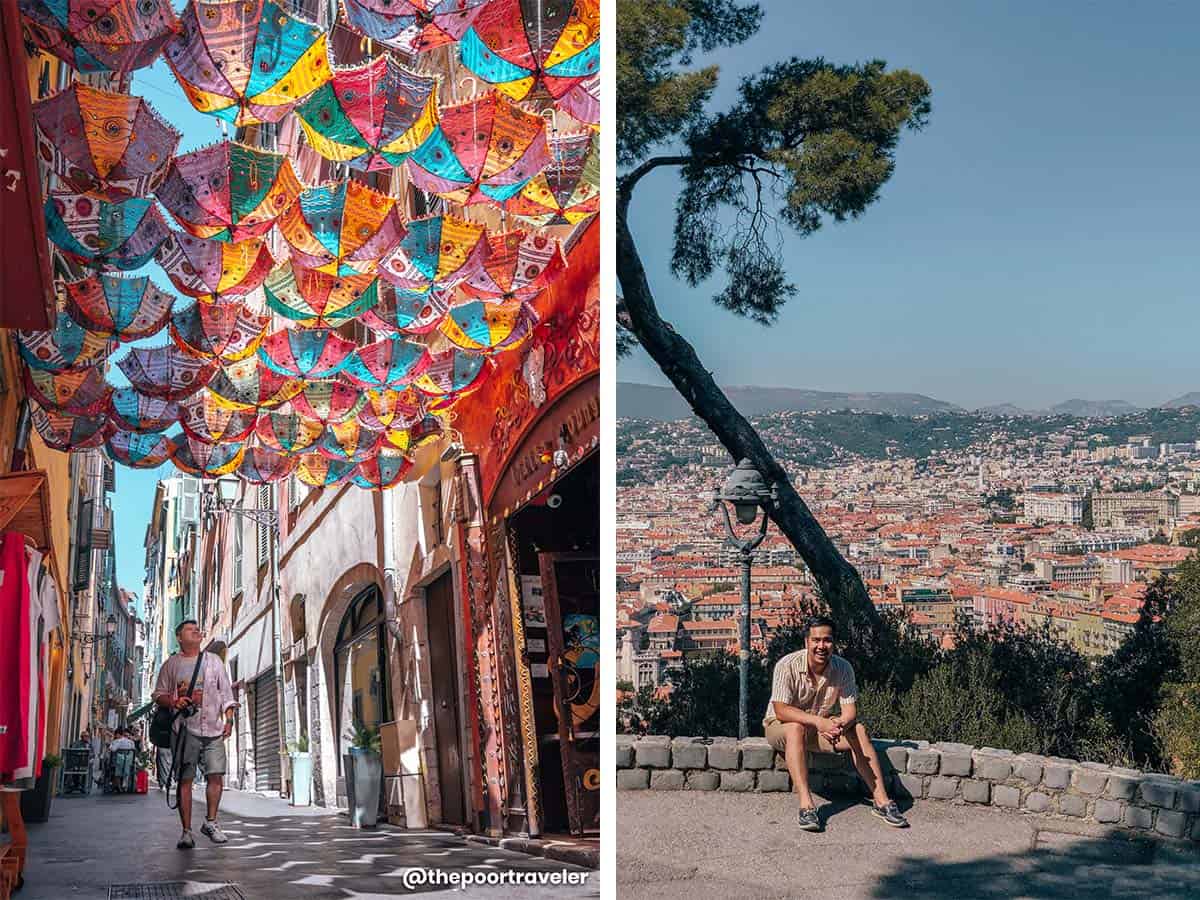
The most ideal base in the region is Nice, dubbed the Jewel of the French Riviera. From here, most of the area is easily accessible. Although Nice is the second most visited city in France today, next only to Paris, it wasn’t always French. It was the Greeks of Marseilles who founded the city in 350 BC and named it Nikaia, after the Greek goddess of victory, Nike. But for many centuries, it was part of the Duchy of Savoy.
Nice’s location and history explain why a strong Italian influence is undeniable in the city today. Ventimiglia, the closest Italian city, is less than an hour away. For a time, it was also under the Kingdom of Piedmont-Sardinia until it rejoined France in 1860. So yes, Nice has only been a part of France for around 150 years!
Here are more bits about Nice:
Nice’s city center is composed of several districts, but these four will interest tourists the most:
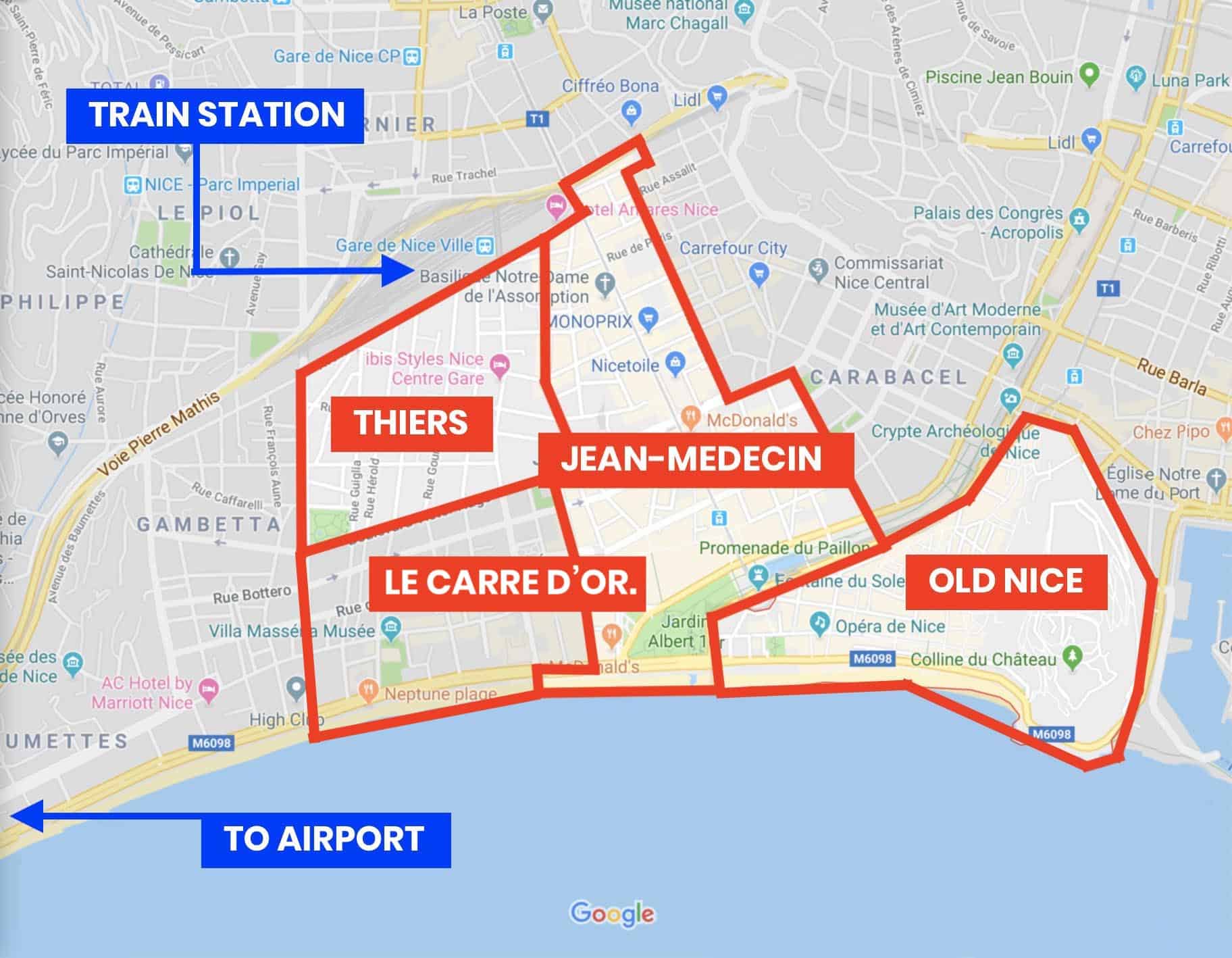
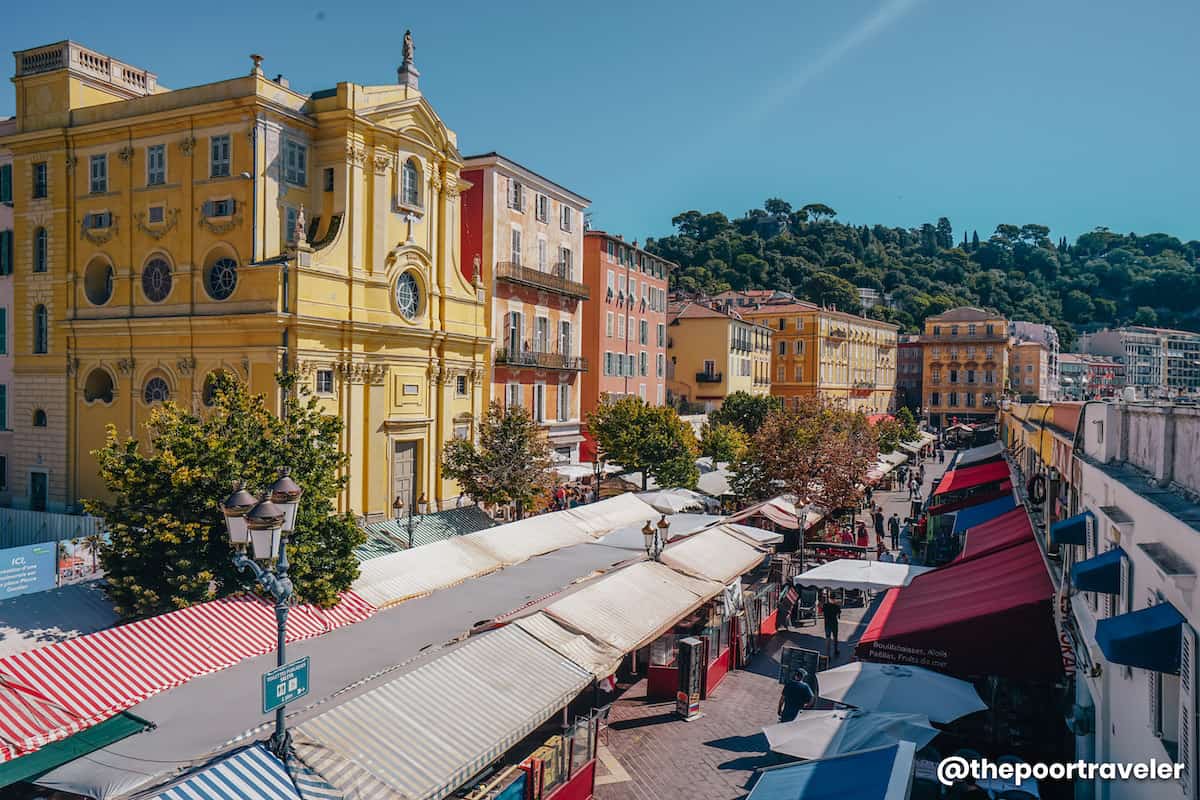
If you’re a budget traveler, the first three would be the most ideal. They’re easily accessible and dotted with numerous points of interest. They also have the most options that won’t bankrupt you.
Luckily, we were able to book the last room at Antares Hostel, which is near the train station and just a block away from Avenue Jean Medecin.

Here are other hostels in Nice, as ranked by Booking.com customers.
Here are top-ranking but relatively inexpensive places to stay in Nice, as scored by Agoda customers:


Nice and the French Riviera are served primarily by Nice Côte d’Azur Airport (NCE), often shortened to Nice Airport. Welcoming almost 14 million passengers per year, it is the third busiest airport in France, next only to Paris’s Charles De Gaulle (CDG) and Orly (ORY).
Nice Airport is used by over 60 airlines (around 20 seasonally), connecting the region to numerous European cities and a few outside the continent.
Nice Airport is located roughly 6 km from the city center of Nice, around 20 minutes away. Most online sources suggest taking Bus 98 or Bus 99 to the city center, but they are no longer operational.
Instead, the newly opened Tram Line 2 (T2) links the airport to the city center. Both Terminal 1 and Terminal 2 have tram stops on this line. If your hotel is in the Old Town, Jean Medecin or in the area near the Nice Ville Station, here’s how to get there from the airport.
For more detailed instructions, READ: NICE AIRPORT TO CITY CENTER!
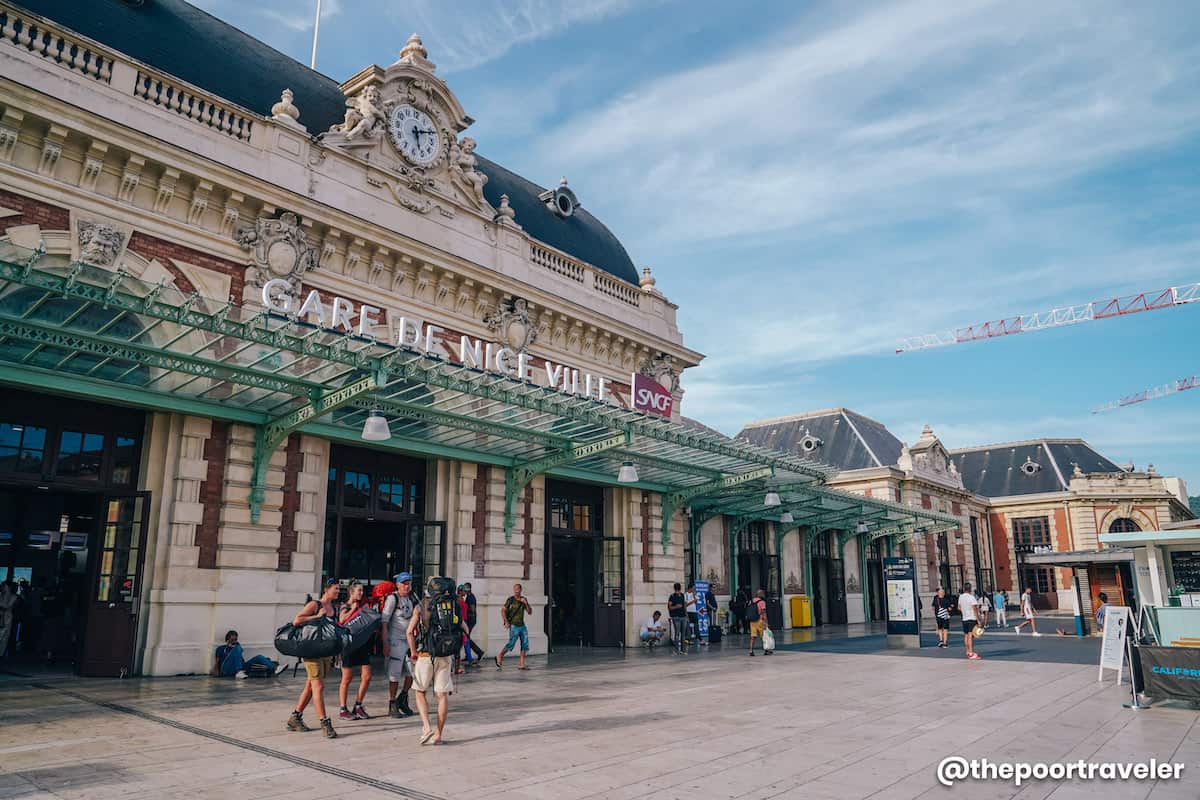
Gare de Nice-Ville is the city’s main railway station. It’s located in the Thiers area, just a short walk from the northern end of Avenue Jean Medecin. Here are the train companies operating here and the cities they connect Nice to:
If you prefer the bus, FlixBus also has trips to Nice from various cities in Europe including Milan, Genoa, Aix-en-Provence, Marseilles, and even as far as Paris and Barcelona.
To search for bus rides to Nice, visit this page: FIND AFFORDABLE BUS HERE! ✅
The best way to get around Nice is by walking! The city is pretty pedestrian-friendly, and most of the key attractions are within spitting distance of each other. But if you can’t travel on foot, you can take the public transportation.
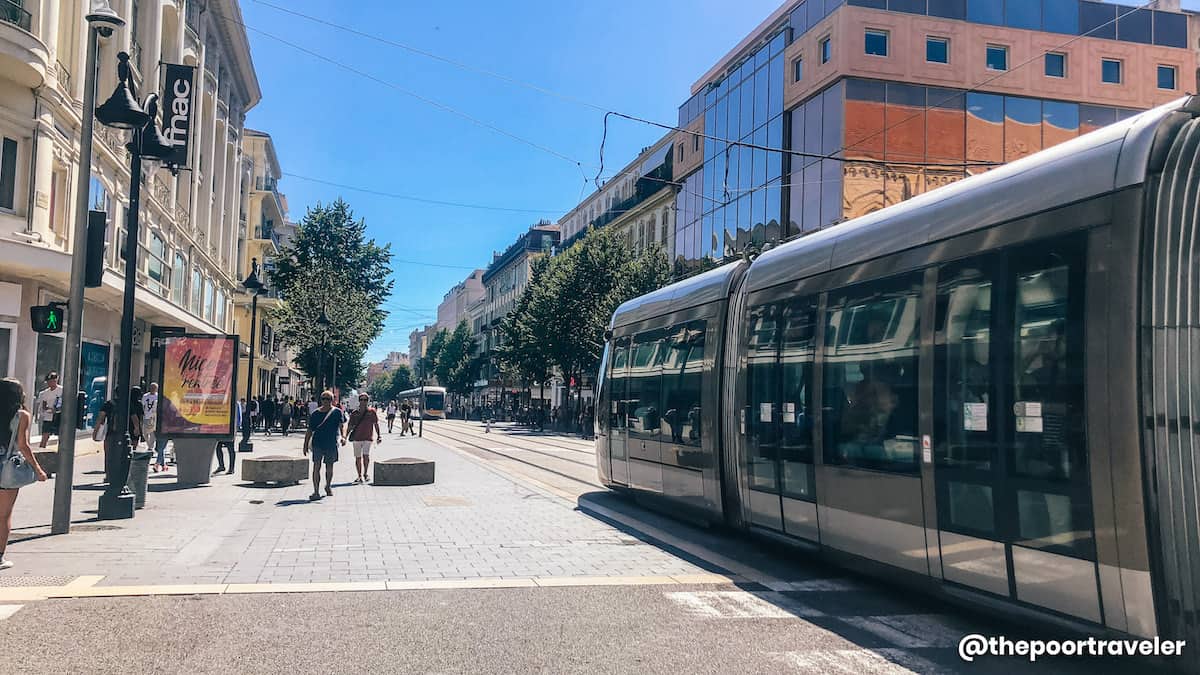
When traveling within Nice, the two primary modes here are the tram and the bus, both operated by Lignes d’Azur.
Another bus company is the TAM (Transport Alpes-Maritimes), which operates regional buses. But because their routes overlap with some of Lignes d’Azur’s within Nice, their ticket systems are integrated.
Fare is only 1.50€, valid for both the tram and the bus, regardless of the distance. However, the ticket is valid only for 74 minutes. You are allowed to make a transfer as long as it’s within the 74-minute period.
Aside from solo tickets, you can also purchase a tram and bus pass, which comes in three variants:
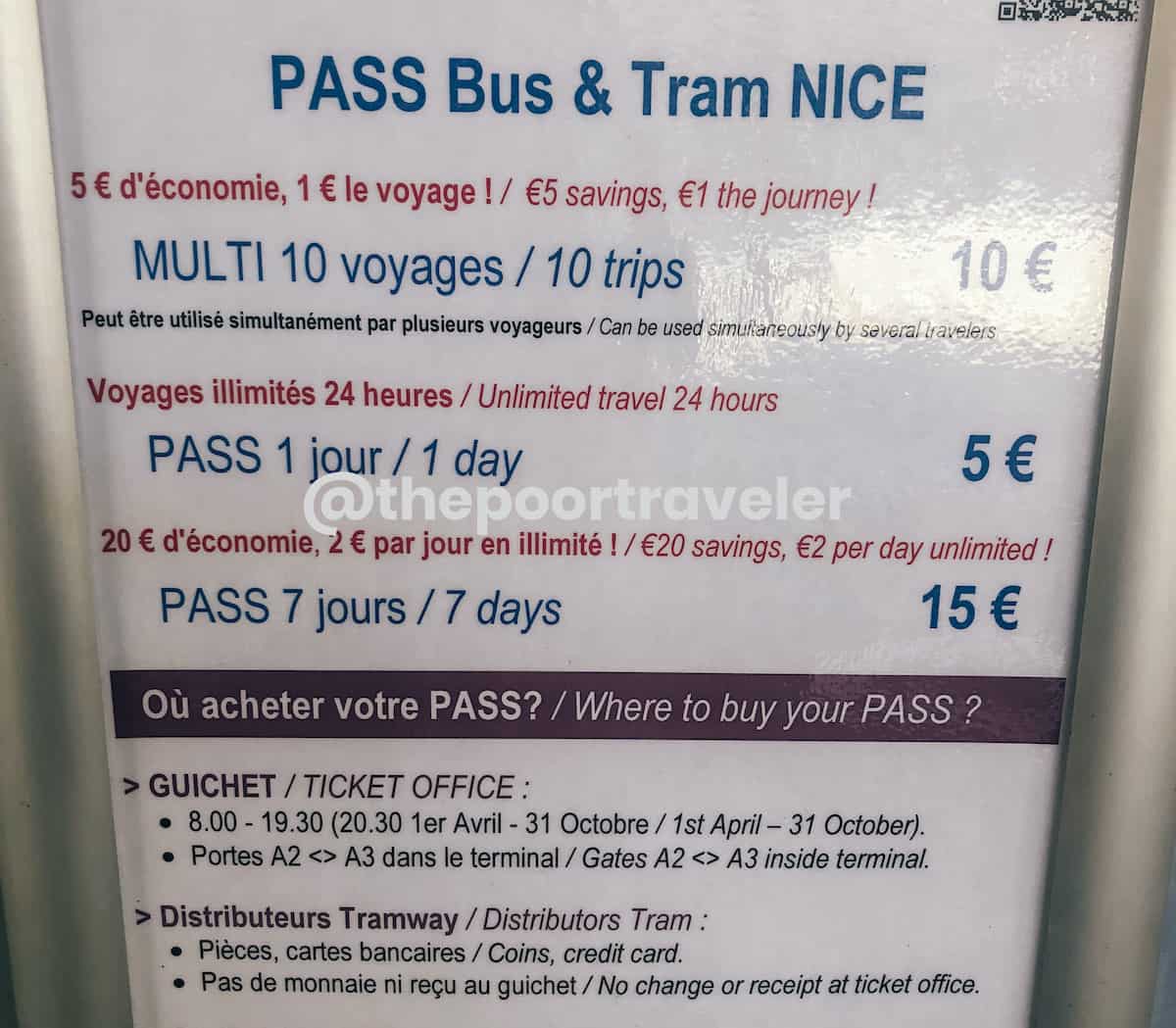
These passes are also accepted by the TAM but only within the common ticket zone, which covers mostly Nice and up to Monaco. When traveling beyond this area, you will need to buy another ticket even if you have a pass.
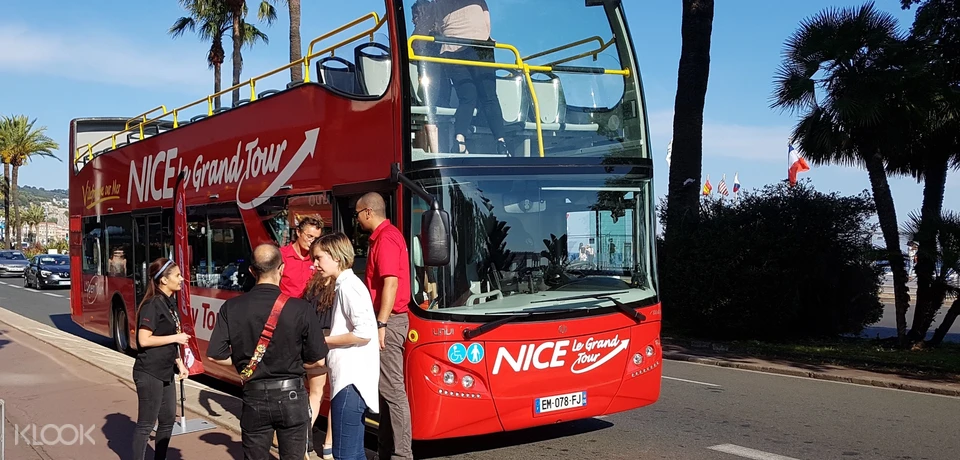
If, for whatever reason, you don’t want to take the public bus or tram, another option is to travel by HOHO bus. This is ideal if you want to be seated comfortably while sightseeing. An audio-guide is provided, which shares information about each stop. You may also get off if you want to explore a stop further, but you will need to wait for the next bus to get to the next site.
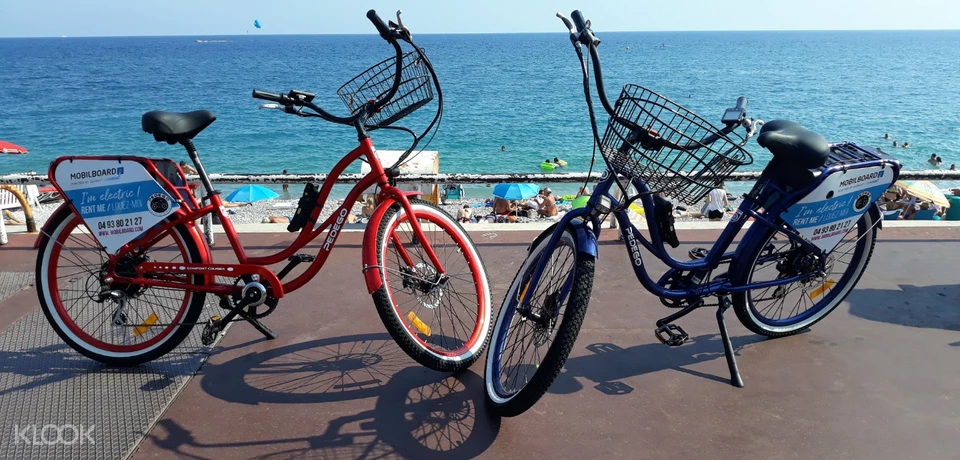
You can rent a regular bike or an e-bike. There are multiple bike lanes that allow you to weave in and out of the beautiful alleys and buildings of Nice. Experience the fetching squares and boulevards on two wheels, and make your way to a quaint part of the city called Vieille Ville. You can rent a bike via Klook.
In this section, instead of discussing the tourist spots one by one, we’re grouping them in tours. This way, you’ll get to visit places close to or accessible from each other. You can either do these tours on your own or you can join organized group tours. We’ve provided both the links to sites where you can book such tours and, if you prefer to pull a DIY, the instructions on how to get there by public transportation.
For a specific list of places to visit and things to do in and around Nice, check out our more detailed post here: NICE ATTRACTIONS!
We booked with Riviera Bar Crawl Tours. This 2-hour tour will take you around the Old Town, stopping at some interesting landmarks along the way. Because it’s a guided tour, you’ll have a better appreciation of each site as you learn along the way.
Here are a few of the key stops:
These are just some of the stops. After combing the Old Town, you’ll be marching towards Promenade des Anglais. The tour ends at the Castle Hill, where you can spend your time after the tour.
It’s FREE in theory. But you are expected to tip the guide. How much you should tip depends on how much you liked the tour. I usually tip 5€ to 10€. But I add more if the tour is exceptional.
Although it is free, you are encouraged to register beforehand. You can do that here.
Operating days: Tuesday-Sunday (unavailable on Mondays)
Meetup point: Place Massena fountain
Meetup time: 11 am
Duration: 2.5 hours
The second smallest country in the world, the Principality of Monaco is an independent microstate on the Riviera, but it’s easily accessible from Nice. Some of the key attractions are the Palais du Prince, the Oceanographic Museum, Jardin Exotique, and Larvotto Beach. It also hosts one of the most prestigious racing events in the world — the Monaco Formula One Grand Prix.
How to get to Monaco: You can take the scenic Bus 100. Fare: 1.50€. Travel time: 45 minutes. Alternatively, you may take the train from Gare de Nice-Ville. Fare: 4.10€. Travel time: 20 minutes.
For a better appreciation of Monaco, we recommend joining a guided tour instead. The tour starts at Gare de Nice-Ville, where you’ll meet the guide who will lead you by train to Monte Carlo. The guide will take you around Monaco, sharing information about each attraction along the way. You can book this tour on Klook.
Aside from Monaco, Nice is the usual jumpoff point to other destinations in the French Riviera including Antibes, Villefranche-sur-Mer, and Cannes. You can take either the bus or the train, or join a group tour.
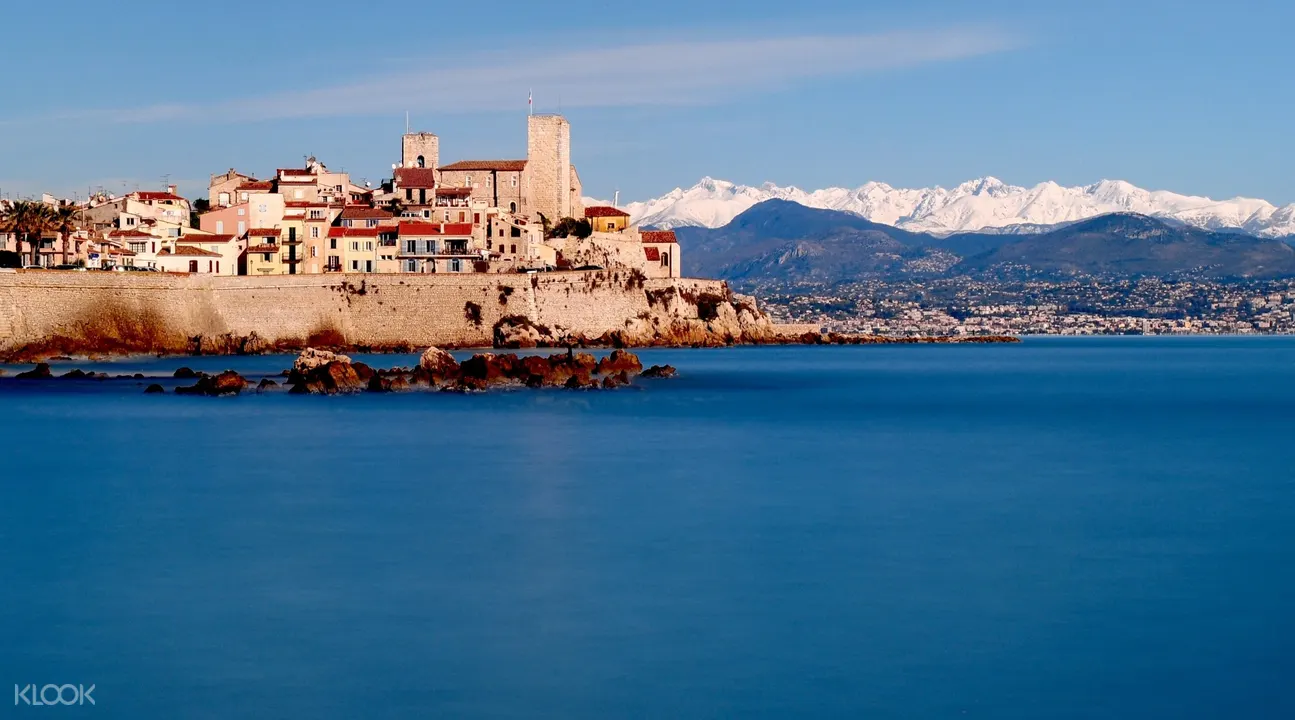
If you want to see much of the Riviera in a day or you need a guide, a good option is to join a group tour. You’ll find dozens of them, each with their own itineraries. The tour available on Klook ticks most of the boxes: Mont Boron, Villefranche, Eze, Monaco, and Cannes.
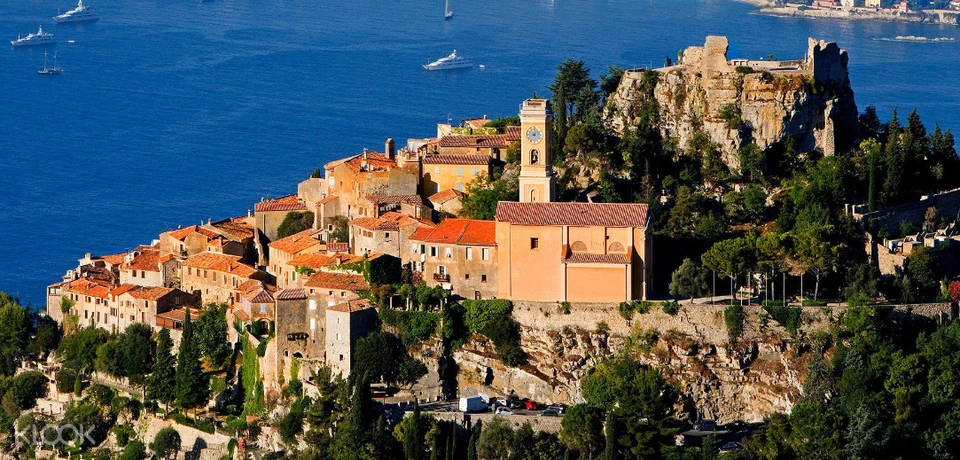
While it’s easy to understand why most tourists flock towards the seaside cities, one must not dismiss the quaint and cozy villages farther inland. Three of the most notable communes in Alpes-Maritimes are Grasse, the world’s perfume capital; Opio, where you can learn the process of making olive oil; and Gourdon, home to the Saut du Loup waterfall and Loup Gorge.
French food is globally celebrated. That alone is reason enough to stuff your face in Nice. But there’s one more reason: Niçoise cuisine is distinct, utilizing the fresh ingredients readily available in the region, with a dash of Italian influence. Some of the dishes you shouldn’t miss are:
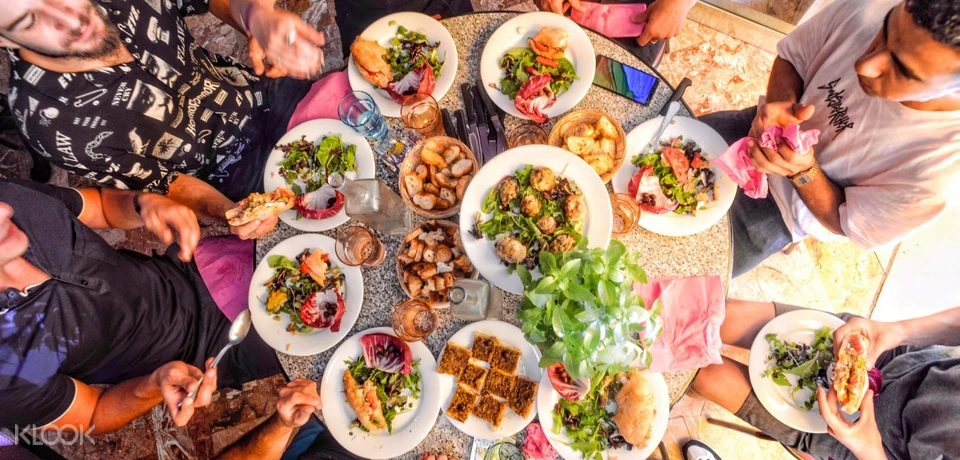
When choosing a place to eat, look for the “Cuisine Nissarde” sign. This label is awarded to restaurants that serve quality Niçoise specialties and provide warm service.
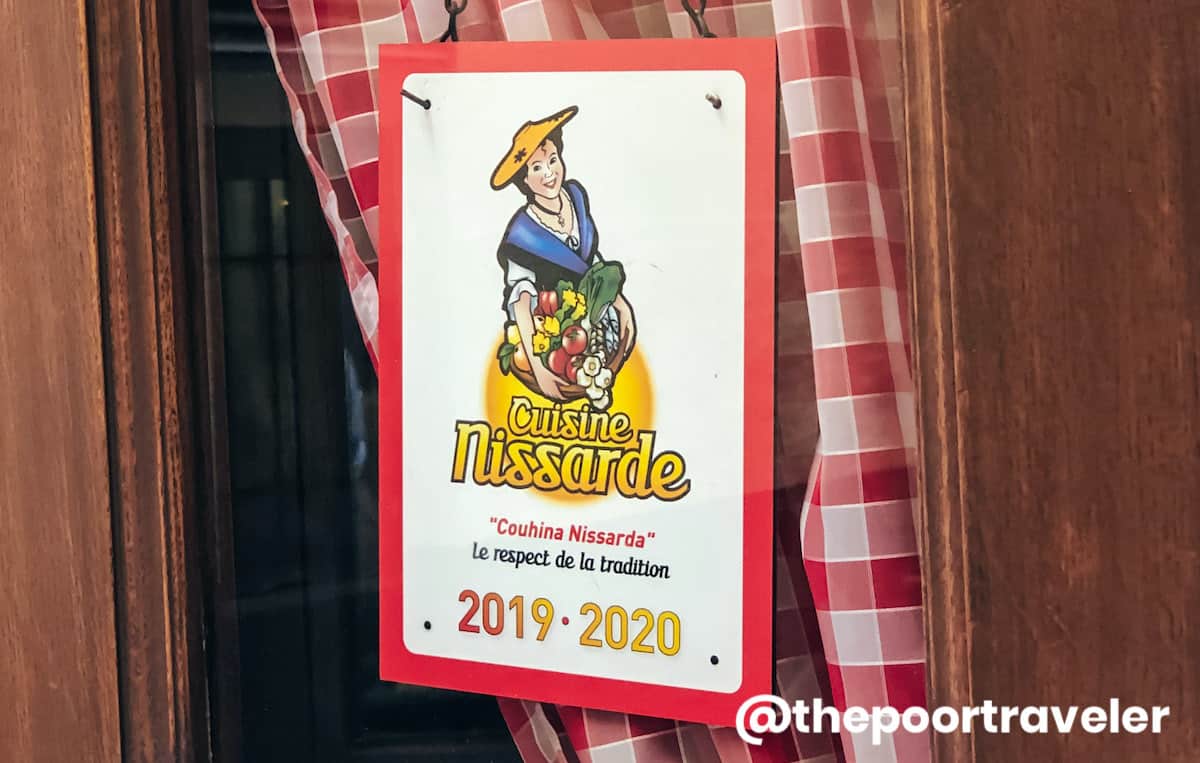
Oh! Don’t forget to treat yourself to a scoop or two of refreshing ice cream, especially if you’re visiting in summer. Try special regional flavors like lavender (yep!), thyme, black olive, and tomato!
If you want to learn more about each dish — how they are prepared, where they originated, and more — join a guided food tour! The food tour on Klook features pan bagnat, socca, farçis niçois, and pissaladière. You also get to try artisanal macarons and gelato (Italian ice cream).
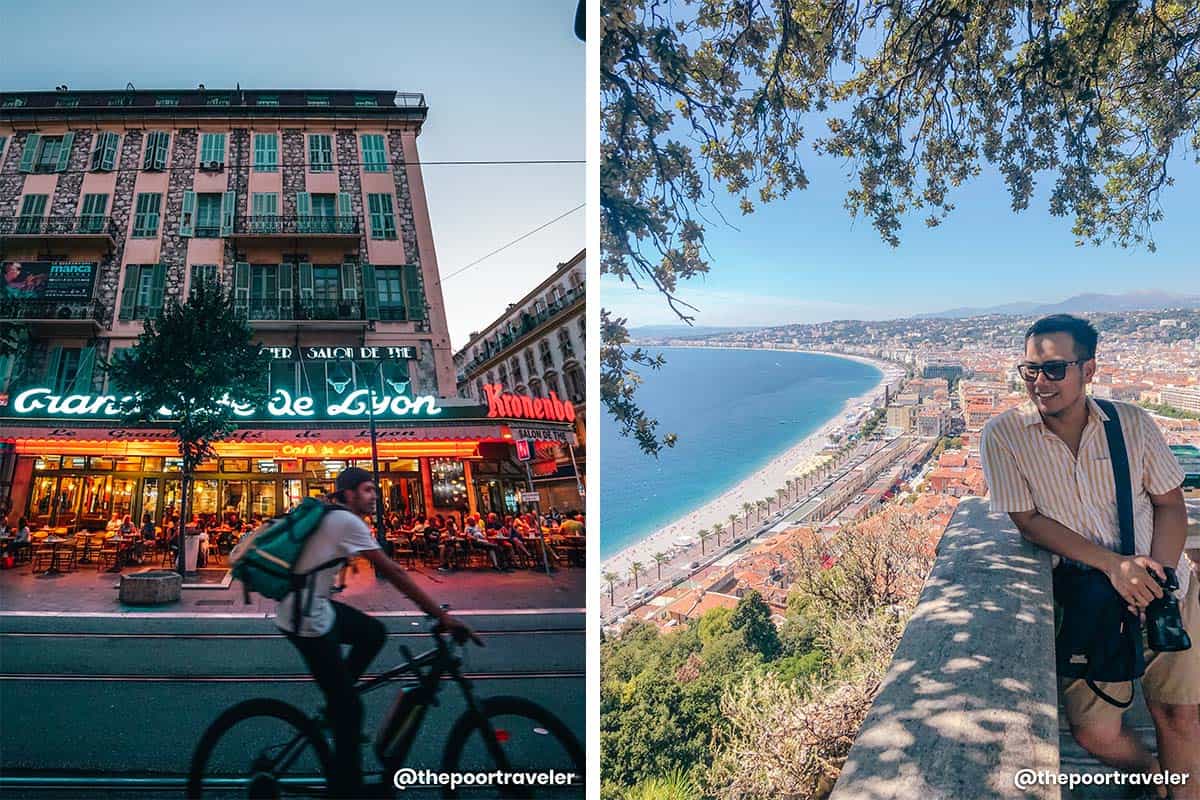
Although it is possible to visit multiple Riviera destinations in one day, you could also take it slow by visiting just one or two and spending more hours there. Aside from Monaco, you could visit Antibes, Villefranche-sur-Mer, Menton, Eze, and Cannes.
We created a separate post for this. READ: DAY TRIPS FROM NICE!
Below is a sample Nice itinerary that you may use as a model in building your own. Feel free to make changes as you see fit.
DAY 1 – ARRIVAL, JEAN MEDECIN
01:35 pm – Arrival at Nice Airport/Station
02:19 pm – Tram to Jean Medecin, 1.50€
02:50 pm – Walk to hotel
03:10 pm – Hotel check-in, rest
05:00 pm – Explore Avenue Jean Medecin
07:00 pm – Dinner, 15€
09:00 pm – Back to hotel
DAY 2 – NICE TOUR
10:00 am – Quick brunch, 10€
10:30 am – Walk to Place Massena
11:00 am – Free Walking Tour
– Tip tour guide, 5-7€
– Buy snacks at market, 7€
02:00 pm – Chill at Castle Hill Park
03:30 pm – Walk along Promenade des Anglais
05:00 pm – Buy gelato from Azzurro/Fenocchio, 5€
05:30 pm – Explore other parts of Old Town
07:30 pm – Dinner, 20€
09:00 pm – Walk back to hotel
DAY 3 – FRENCH RIVIERA TOUR
08:30 am – Hotel pick-up
09:00 am – Start French Riviera Tour, 103€, Book here!
– Lunch, 15€
06:00 pm – Back to Nice
07:00 pm – Dinner, 20€
08:30 pm – Back to hotel
DAY 4 – DEPARTURE
08:30 am – Pack up
10:30 am – Early check out, leave bags
11:00 am – Early lunch, 10€
12:00 pm – Leave for airport/train station, 1.50€
If you’re able to book a bed for 40€ per night, the above itinerary will cost you at least EUR 365 (USD 430, SGD 588, PHP 21,000) per person excluding airfare and airport taxes but including some allowance to cover incidental expenses, future price movements, and other possible expenses we might have missed.
You can insert this into a greater European itinerary. We didn’t include airfare in the budget because many travelers visit Nice on a multi-city tour of Europe and may be coming from various cities, some by train.
You can significantly reduce the cost by skipping the French Riviera group tour and doing it on your own by taking public transportation instead.
Nice is part of France, and France is part of the Schengen agreement. If you’re a Philippine passport holder, you will need a Schengen Visa to visit Nice.
If France is the only country you are going to visit or if you’re traveling to multiple countries but staying in France the longest, you will need to apply for a visa via the French Embassy.
For more information about how to get a visa from the French Embassy, READ: FRENCH SCHENGEN VISA!
Nice has relatively low crime rate. But as in any other touristy city in Europe, be careful of some scams and petty crimes like pickpocketing.
Always keep an eye on your valuables, especially if you’re lounging on the beach, having a meal outdoors, or taking public transportation. Someone might secretly or swiftly steal them.
You might also encounter some of the common scams in Europe. The posts below might help.
Nice has a mild climate that is sunny for most of the year. However, it can get really crowded and hot during the peak summer months of July and August.
The ideal seasons to visit the country are during autumn and spring with the weather just a right mix of comfortable and sunny.
At restaurants, you can round up the bill or leave 5-10% if you truly enjoyed the service.
At FREE walking tours, most participants leave 5€ if it’s a big group and 10€ if it’s a rather small group (fewer than 10 guests).
At a restaurant, ask for “un verre d’eau” or “un carafe d’eau.” When you’re asked if you want flat or sparkling, just say you want tap water.
If you really want bottled water, buy big bottles from a supermarket. It’s much much cheaper than buying small bottles at restaurants. Just buy big bottles, leave them in your room, and refill the small bottle before going out.
Electricity Info: 230 volts, 50 Hz. Common sockets are Type F, which also accept plugs that have two round pins (C and E).
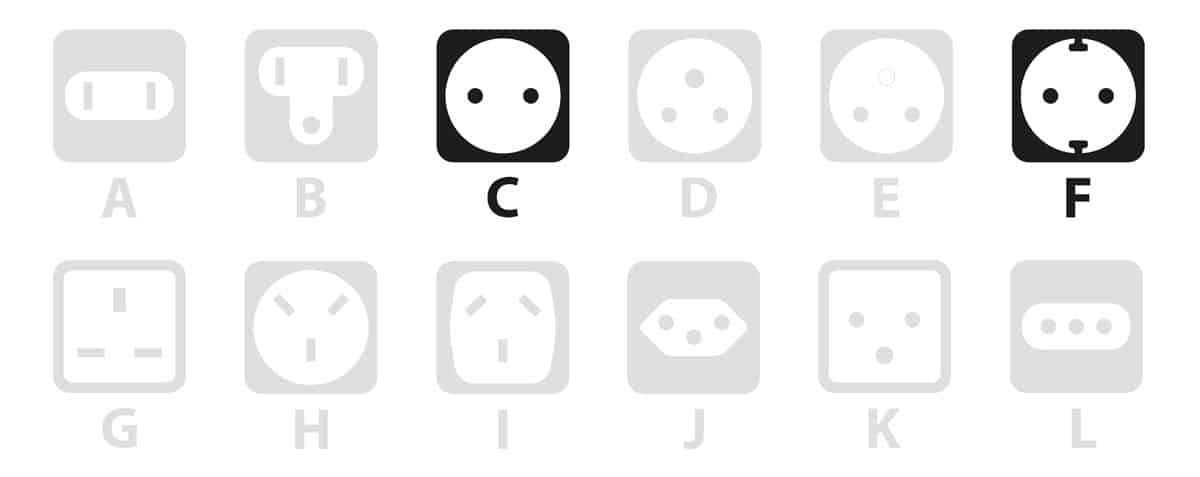

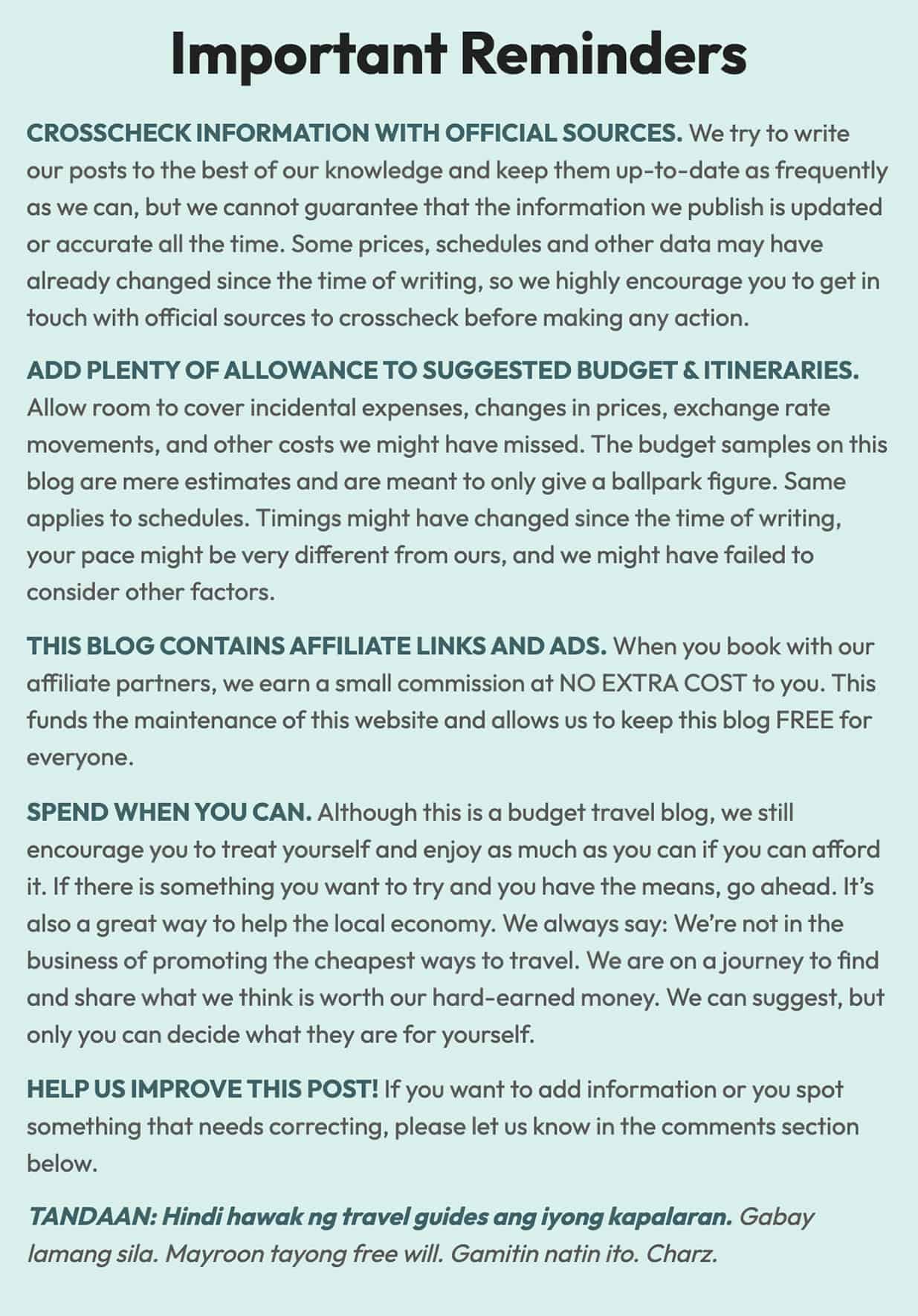
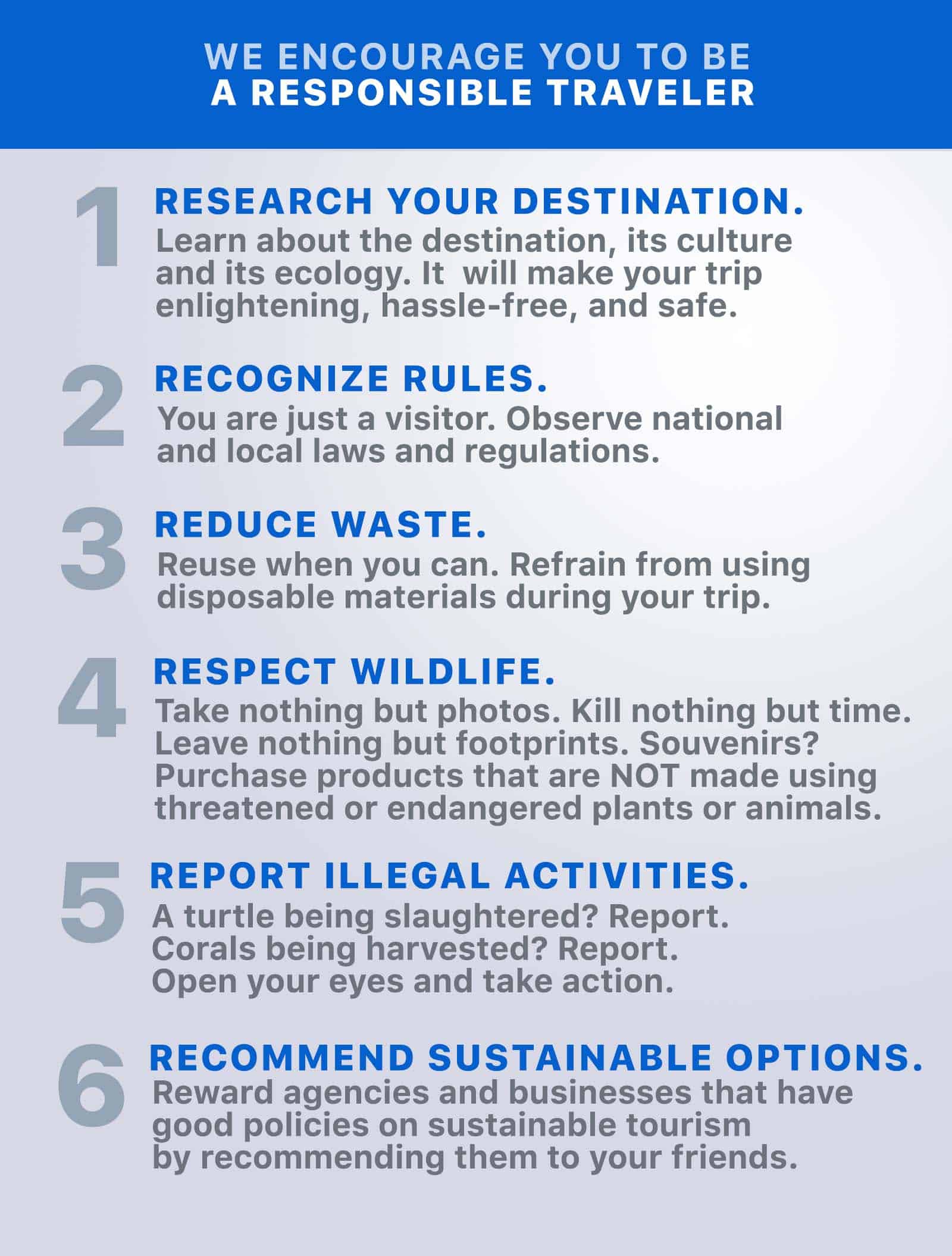
Yosh Dimen is a full-time travel blogger. He has three passions in life: social media, travel, and movies. Yosh has won 3 Philippine Blog Awards and a Palanca Award. Learn more about his personal journeys at Yoshke.com.
Latest posts by Yosh Dimen (see all)